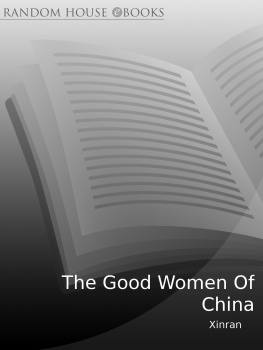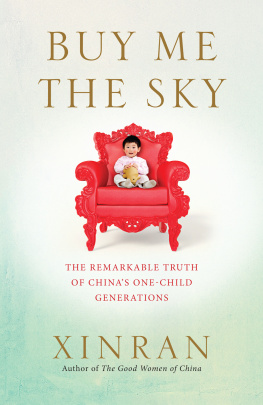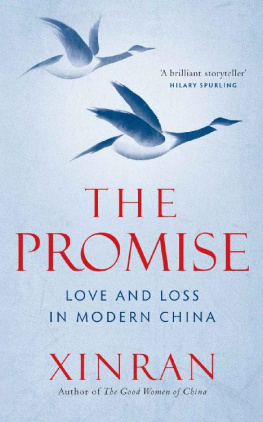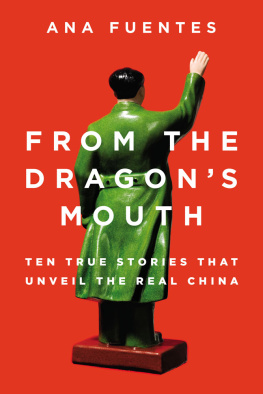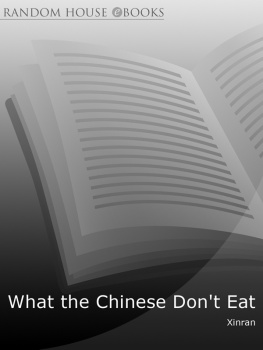1
My Journey Towards the Stories of Chinese Women
Early one spring morning in 1989, I rode my Flying Pigeon bicycle through the streets of Nanjing dreaming about my son PanPan. The green shoots on the trees, the clouds of frosty breath enveloping the other cyclists, the womens silk scarves billowing in the spring wind, everything merged with thoughts of my son. I was bringing him up on my own, without the help of a man, and it was not easy caring for him as a working mother. Whatever journey I went on, though, long or short, even the quick ride to work, he accompanied me in spirit and gave me courage.
Hey, big-shot presenter, watch where youre going, shouted a colleague as I wobbled into the compound of the radio and TV station where I worked.
Two armed policemen stood at the gates. I showed them my pass. Once inside, I would have to face further armed guards at the entrances to the offices and the studios. Security at the broadcasting station was extremely tight and workers were wary of the guards. A story circulated of a new soldier who fell asleep on night duty and was so keyed up that he killed the comrade who woke him.
My office was on the sixteenth floor of the forbidding, twenty-one-storey modern building. I preferred to climb the stairs rather than risk the unreliable lift, which broke down frequently. When I arrived at my desk, I realised I had left my bicycle key in the lock. Taking pity on me, a colleague offered to go and telephone down to the gatekeeper. This was not so easy since no junior employee at that time had a telephone and my colleague would have to go to the section heads office to make the call. In the end, someone brought me up my key with my mail. Amidst the large pile of letters, one immediately caught my attention: the envelope had been made from the cover of a book and there was a chicken feather glued to it. According to Chinese tradition, a chicken feather is an urgent distress signal.
The letter was from a young boy, and had been sent from a village about 150 miles from Nanjing.
Most respected Xinran,
I listen to every one of your programmes. In fact, everyone in our village likes listening to them. But I am not writing to tell you how good your programme is; I am writing to tell you a secret.
Its not really a secret, because everyone in the village knows. There is an old, crippled man of sixty here who recently bought a young wife. The girl looks very young I think she must have been kidnapped. This happens a lot around here, but many of the girls escape later. The old man is afraid his wife will run off, so he has tied a thick iron chain around her. Her waist has been rubbed raw by the heavy chain the blood has seeped through her clothes. I think it will kill her. Please save her.
Whatever you do, dont mention this on the radio. If the villagers find out, theyll drive my family away.
May your programme get better and better.
Your loyal listener,
Zhang Xiaoshuan
This was the most distressing letter I had received since I had started presenting my evening radio programme, Words on the Night Breeze, four months earlier. During the programme I discussed various aspects of daily life and used my own experiences to win the listeners trust and suggest ways of approaching lifes difficulties. My name is Xinran, I had said at the beginning of the first broadcast. Xinran means with pleasure. Xin xin ran zhang kai le yan, wrote Zhu Ziqing in a poem about spring: With pleasure, Nature opened its eyes to new things. The programme was a new thing for everyone, myself included. I had only just become a presenter and I was trying to do something that hadnt been done on the radio before.
Since 1949, the media had been the mouthpiece of the Party. State radio, state newspapers and, later, state television provided the only information Chinese people had access to, and they spoke with one identical voice. Communication with anyone abroad seemed as remote as a fairy tale. When Deng Xiaoping started the slow process of opening up China in 1983, it was possible for journalists, if they were courageous, to try and make subtle changes to how they presented the news. It was also possible, although perhaps even more dangerous, to discuss personal issues in the media. In Words on the Night Breeze I was trying to open a little window, a tiny hole, so that people could allow their spirits to cry out and breathe after the gunpowder-laden atmosphere of the previous forty years. The Chinese author and philosopher Lu Xun once said, The first person who tasted a crab must also have tried a spider, but realised that it was not good to eat. As I awaited the reaction of my listeners to the programme, I wondered whether they would think it was a crab or a spider. The number of enthusiastic letters that piled up on my desk convinced me that it was the former.
The letter I received from the young boy Zhang Xiaoshuan was the first that had appealed for my practical help and it threw me into confusion. I reported it to my section head and asked what I should do. He suggested indifferently that I contact the local Public Security Bureau. I put a call through and poured out Zhang Xiaoshuans story.
The police officer on the other end of the line told me to calm down. This sort of thing happens a lot. If everyone reacted like you, wed be worked to death. Anyway, its a hopeless case. We have piles of reports here, and our human and financial resources are limited. I would be very wary of getting mixed up in it if I were you. Villagers like that arent afraid of anyone or anything; even if we turned up there, theyd torch our cars and beat up our officers. They will go to incredible lengths to make sure that their family lines are perpetuated so as not to sin against their ancestors by failing to produce an heir.
So, I said, Are you telling me you are not going to take responsibility for this girl?
I didnt say I wouldnt, but...
But what?
But theres no need to hurry, we can take it step by step.
You cant leave someone to die step by step!
The policeman chuckled. No wonder they say that policemen fight fire and journalists start fire. What was your name again?
Xin... ran, I said through gritted teeth.
Yes, yes, Xinran, good name. All right, Xinran, come over. Ill help you. He sounded as if he was doing me a favour rather than performing his duty.
I went straight to his office. He was a typical Chinese police officer: robust and alert, with a shifty expression.
In the countryside, he said, the heavens are high and the emperor is far away. In his opinion the law had no power there. The peasants feared only the local authorities who controlled their supplies of pesticide, fertiliser, seeds and farming tools.
The policeman was right. In the end, it was the head of the village agricultural supplies depot who managed to save the girl. He threatened to cut off the villagers supply of fertiliser if they did not release her. Three policemen took me to the village in a police car. When we arrived, the village head had to clear the way for us through the villagers, who were shaking their fists and cursing us. The girl was only twelve years old. We took her away from the old man, who wept and swore bitterly. I dared not ask after the schoolboy who had written to me. I wanted to thank him, but the police officer told me that if the villagers found out what he had done, they might murder him and his family.
Witnessing the power of the peasants first-hand, I began to understand how Mao had defeated Chiang Kai-shek and his British and American weapons with their help.
The girl was sent back to her family in Xining a twenty-two-hour train journey from Nanjing accompanied by a police officer and someone from the radio station. It turned out that her parents had run up a debt of nearly 10,000 yuan searching for her.

